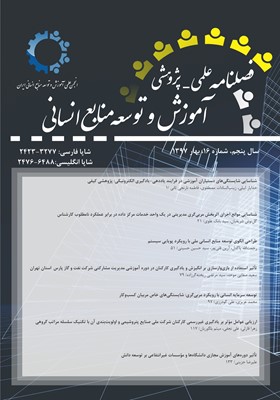مدل BOM؛ طراحی و عرضه خدمات یادگیری مبتنی بر امکانات رایانش ابری توسط ارائهدهندگان خدمات یادگیری
محورهای موضوعی :
دکتر فیروز نوری كلخوران
1
,
کورش فتحی واجارگاه
2
,
اباصلت خراسانی
3
,
امير رضا اصنافي
4
![]()
1 - دانشگاه بوعلي سينا
2 - دانشگاه شهید بهشتی
3 - دانشگاه شهید بهشتی
4 - دانشگاه شهيد بهشتي
کلید واژه: رایانش ابری, یادگیری, توسعه منابع انسانی, ارائهدهندگان خدمات یادگیری و مدل BOM,
چکیده مقاله :
رایانش ابری و خدمات ابر به عنوان یک راه حل فناورانه برای توسعه خدمات آموزشي میتواند در تسریع و توسعه خدمات این دسته از فعالیتها بسیار سودمند باشد. هدف از انجام پژوهش حاضر ارائه مدلی منسجم برای طراحی و عرضه خدمات یادگیری توسط ارائهدهندگان خدمات یادگیری (LSPs) مبتنی بر امکانات رایانش ابری به منظور آموزش و یادگیری منابع انسانی میباشد. رویکرد پژوهش حاضر آمیخته و روش مورد استفاده، پژوهش نظریهای میباشد. برای شناسایی عناصر مدل طراحی و عرضه خدمات یادگیری مبتنی بر امکانات رایانش ابری با متخصصین حوزههای آموزش سازمانی و کسب و کار مصاحبههای نیمه ساختار یافته سازماندهی شد. شرکتکنندگان در فرآیند مصاحبه با روش نمونهگیری نظری انتخاب شدند. مصاحبهها با روش کدگذاری باز سازماندهی شدند. در این پژوهش به منظور محاسبه پايايي كدگذاريهاي انجام شده در مصاحبههاي تخصصی، از روش پايايي بازآزمايي استفاده شد. سطح توافق (PAQ) مساوی با عدد 0.83 میباشد که نشان دهنده سطح بالایی از توافق درونی دارد. در مرحله دوم برای انسجام بخشی به دادهها و تعیین ارتباط عناصر مدل از ساختار و روش مدیریت تعاملی (IM) و نرمافزار الگوسازي ساختاري تفسیري (ISM) استفاده شد. و در بخش سوم که مرتبط با بخش کمی پژوهش میباشد از روش تحلیل سلسله مراتبی (AHP) و نرمافزار (Expert Choice) برای وزندهی به عناصر مدل طراحی و عرضه خدمات یادگیری مبتنی بر امکانات رایانش ابری استفاده گردید. براساس نظر اجماعی مدل جامعی موسوم به BOM برای ارائه خدمات یادگیری مبتنی بر رایانش ابری ارائه گردید که عناصر اصلی مدل به ترتیب اهمیت و وزن عناصر در مدل، شامل ابزارها و مكانيزمهاي یادگیری فناورانه (0.215)، استقرار نظام برنامهریزی درسی (0.208)، طراحی خدمات یادگیری (0.151)، خدمات پشتیبانی یادگیری (0.105)، ارزیابی عملکرد نظام یادگیری (0.074)، مکانیزمها و ابزارهای انگیزشی بهرهبرداری از فضای ابر برای یادگیری (0.068)، ابعاد حقوقی بهرهبرداری از فضای ابر (0.046)، مدیریت كسب و كار خدمات یادگیری (0.040)، ارزشیابی برنامه درسی (0.038) و بازاریابی، تبلیغات و فروش خدمات يادگيري (0.033) میباشد.
Cloud computing and cloud services, as a technological solution to the development of educational services, can be very useful in accelerating and expanding services for this type of activities. This study aims to provide a coherent model for the design and delivery of services provided by Learning Service Providers (LSPs) based on the capabilities of cloud computing for human resources training and learning. To achieve this, a mixed approach and the theoretical research method were adopted. To identify the elements of the model for designing and delivering cloud-based learning services, we organized semi-structured interviews with specialists in organizational learning and business education. The participants in the interview process were selected using the theoretical sampling method. The interviews were organized using the open coding method. The test-retest reliability method was used in this study to measure the reliability of the coding process used in the specialized interviews. The consistency level (PAQ) was equal to 0.83, indicating a high level of internal consistency. In the second phase, the structure and method of Interactive Management (IM) and the Interpretive Structural Modeling (ISM) software were used for integrating the data and determining the relationship between the elements of the model. In the third section, related to the quantitative part of the research, the Analytic Hierarchy Process (AHP) and Expert Choice software were used to weigh the model design and cloud computing-based learning service delivery elements. Then, a comprehensive model called BOM was presented for the delivery of cloud computing-based learning services. The main elements of the model in the order of weight and level of importance in the model include the tools and mechanisms of technological learning (0.215), establishment of a curriculum planning system (0.208), design of learning services (0.151), learning support services (0.105), learning system performance evaluation (0.074), incentive mechanisms and tools for the use of cloud space for learning (0.068), legal dimensions of the use of cloud space (0.046), learning services business management (0.040), curriculum assessment (0.038), and marketing , advertising and sales of learning services (0.033).
